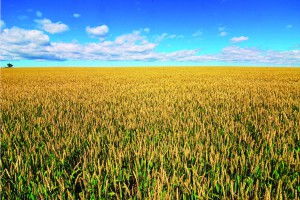

Why invest in Farmland?
I entered the agricultural real estate market just over a year ago. Coming from a background in economics, I was driven to learn the reasoning behind a farmland investment. Through my year of experience speaking with land owners and investors, as well as extensive reading on the subject; here are four reasons why farmland is a great place to invest capital.
1. The economic driver behind farmland’s long term value is undeniable. A growing world population means higher demand for food. The UN estimates the world population to grow to 9.2 Billion by 2050. This will translate to upward pressure on commodity prices and the need to greatly increase farming yields. According to the UN, in order to feed the world’s growing and longer living population, agricultural outputs will need to double by 2050. In order for this to occur, output must increase by 3.4% annually. To put this increasing food demand into perspective, experts are predicting that agriculture will need to produce more food over the next 50 years than what was produced during the previous 10,000 years. Many of the rapidly growing populations around the world are located in countries with relatively little farmland.
For example, China has 20% of the world’s population with only 7% of the world’s farmable land. As their populations grow, these countries are quickly becoming net importers of food products. United States farmers will prove to be vital in feeding this demand. Only 7% of the planet’s surface is suitable for farming, but 50% of land in the US may be cultivated for farming. In addition, US agricultural policy continues to place a high degree of importance on food security and independence (as evidenced by our most recent farm bill). Combined with the growing demand for food, The United States is a prime location for agricultural investment.
2. Farmland offers an excellent hedge against inflation. Many investors face the challenge of simply maintaining the wealth they have already built. The threat of inflation can strongly impact an investor’s real worth. Surprisingly, farmland has been a higher returning, lower risk investment than gold in the long run. Farmland provides returns similar to stocks but with similar risk levels to bonds. Over the past 100 years, farmland has only decreased in value three times: during the great depression, the inflation crisis of the early 1980s and most recently during the housing crisis of 2008/2009. Despite three bumps in the road over the past 100 years, historical US farmland returns are one of the most attractive asset classes that compares favorably with more traditional assets such as stocks and bonds. Over the last 20 years, American farmland has provided a total return to investors of 12.4% that is a combination of appreciation and current income from cash rental contracts. Similar long term appreciation in farmland has been experienced in Europe, South America, and Australia. Research shows a positive correlation between US farmland and the Consumer Price Index (CPI). Farmland’s correlation to the CPI exceeds that of stocks, bonds, and non-farm real estate. The farmland asset class has many of the characteristics of an inflation-indexed bond (high positive inflation correlation, and consistent real returns).
3. Farmland is an extremely effective way to provide portfolio diversification. Because farmland has not been “institutionalized” to the same degree as other forms of real estate, it provides an excellent way to get away from the mainstream financial system. Unlike owning futures contracts on commodities, a landowner benefits from both increasing commodity prices and increasing yields. Over time, commodity prices have not proven to appreciate. However, farming yields have drastically increased over time. Owning land provides exposure to the technological advancements in farming. Land values and rents are directly connected with yield potential.
4. Farmland can be less time and money intensive than other real estate. If the land does not have buildings, there is nothing physical to maintain. Modern technology means that farmers can farm incredible amounts of land; therefore they are constantly looking for new land to work. If a farmer is not leasing your land, it is typically easy to find another tenant.
Whether you are a farmer or investor, our team at SVN Land Group can help you find and purchase investment grade farmland. As many land transactions on the Eastern Shore never hit the public market, it is valuable to have an agent that is entrenched in the local land markets. For investors looking to maximize rental income from their farm, SVN Land Group also provides a full service leasing platform with the goal of establishing long term leases to quality producers. Please contact us to help with your farmland investments.

Sources:
Colvin, Greyson S., and T. Marc. Schober. Investors’ Guide to Farmland. New York, NY: Greyson S. Colvin, 2012. Print.
“Barbarians at the Farm Gate.” The Economist. The Economist Newspaper, 03 Jan. 2015. Web. 18 Mar. 2015.



